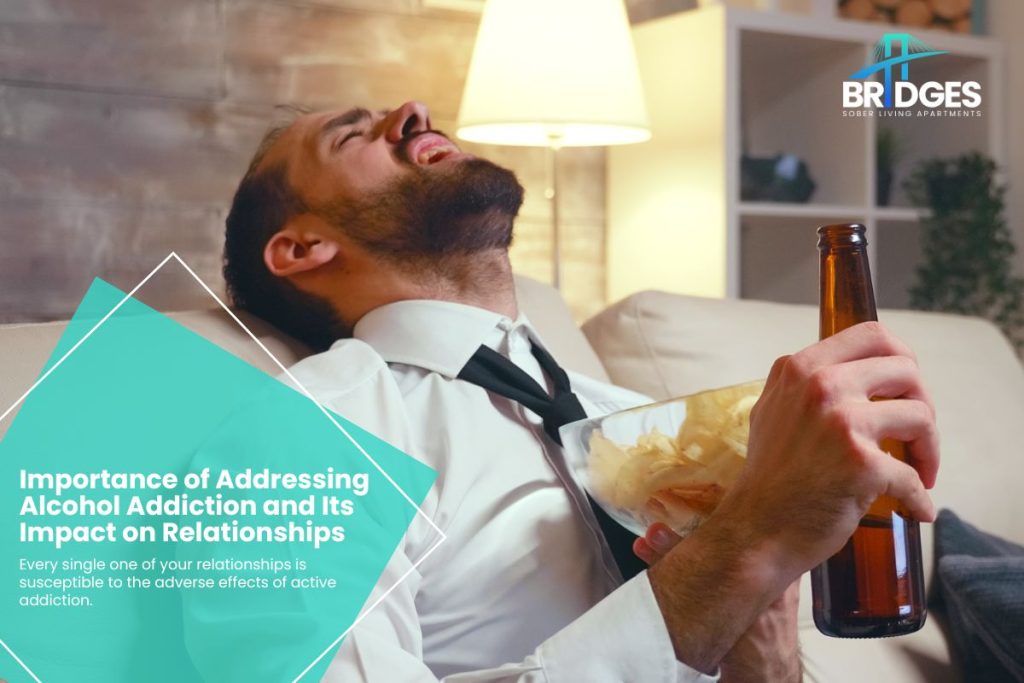Alcohol addiction can deeply affect relationships, causing emotional, physical, and social strain on both the individual struggling with addiction and their loved ones. The impact is often complex and far-reaching:
Understanding these impacts is the first step toward healing and rebuilding damaged relationships through recovery, communication, and forgiveness.
Every single one of your relationships is susceptible to the adverse effects of active addiction. Your partner, children, and other members of your family may be impacted by alcohol dependence in various ways, including financial strain, domestic violence, difficulties in intimacy or sex drive, and harmful consequences on children.

Repairing relationships requires effort on both sides. Even if it’s impossible to instantly repair the damage done by spiteful words and traumatic memories, the divide in a relationship can be healed with time and effort. Your strong social network can improve your quality of life, self-esteem, and resilience.
If you believe that your family or romantic relationships have suffered due to your heavy drinking, consider getting professional assistance so that you can be the best version of yourself for the people in your life.
Unfortunately, your loved ones are frequently left with the trauma that alcohol use disorder causes. They may feel helpless and anticipate that you cause more trouble and suffer consequences as a result of your heavy drinking.
Loneliness or isolation
Low self-esteem
Anxiety or depressive symptoms
Withdrawal from people
Stress
Irresponsible or out-of-character behavior, such as being physically abusive
Relationship or marital conflict
Frustration and grief
Shame
Resentment
Fear and confusion
Trust issues
Worry about their friend or family member struggling with substance abuse
Increased stress
Alcohol addiction can be treated, even if there are several risk factors present. Keep in mind that your past does not determine your future and that no risk factor is permanent. Contact a treatment provider immediately if you have difficulty with alcohol abuse.

Acknowledging the Problem:
People with alcohol abuse often refuse to come out of their denial. An essential part of rebuilding trust is realizing when your actions are destructive and unsafe. Acknowledging that you have a problem is the first step toward solving it.
Apologizing Sincerely:
One of the many stages of recovery from substance abuse is making amends to those you’ve hurt. The manner in which you apologize is equally important to the apology itself. You should always strive for sincerity and honesty. You must demonstrate genuine concern for the other person’s well-being and a desire to make things right.
Demonstrating Commitment to Change:
Demonstrating a commitment to change is another way to win back people’s trust. For instance, if someone asks whether you want to go out to the bar, you should decline. Tell them you’re committed to change and mean it. Put your commitment into practice every time you’re confronted with a circumstance that could threaten your sobriety.
Taking Consistent Action in Honesty and Communication:
If you want to restore trust and heal any wounds in your relationships, try being more open and honest with them. Being open and honest will go a long way toward involving these people in your recovery progress.
Practicing Forgiveness:
The ability to forgive yourself and others is crucial to recovering from the trauma of addiction. This does not imply downplaying or justifying the actions that triggered the trauma, but rather letting go of the anger and resentment caused by substance abuse. Although difficult, forgiveness is essential to achieving healing and long-term fulfillment.
In addition, it is important to set boundaries and cut ties with unhealthy relationships. Alcohol dependence can lead to the formation of toxic relationships that influence you to resort to drinking alcohol to numb painful feelings. Make room for healthy relationships as you cut off people who negatively affect your sober lifestyle.
Establishing healthy boundaries in relationships is an important part of keeping each person feeling safe, supported, and respected. They help you express to others how you like to be treated and what kinds of actions you find acceptable or unacceptable. Having boundaries will protect your relationship and ensure that you are able to communicate your needs safely while going through addiction recovery.

People struggling with alcohol abuse may lack boundaries. They only think about other people meeting their needs and may have stopped caring for themselves. In addition, some of them may have been raised in households where boundaries weren’t set or followed.
In alcohol abuse, intense shame, dishonesty, and manipulation cause people to cross boundaries. They fall into codependent relationships that revolve around alcohol use. As a result, boundaries became blurred.
Identifying Personal Limits:
Establish your own values, beliefs, and limits. This will make it clear to everyone around you how you prefer to be treated and give you the confidence to stand up for yourself.
Communicating Boundaries Clearly:
Start the process of communicating boundaries clearly with friends and family in a constructive way. Avoid opening your sentences with “You make me feel…” and try instead to begin each sentence with “I feel…” This can prevent an aggressive response while still making your point.
Consistently Enforcing Boundaries:
It may not be easy, but you need to be consistent when enforcing boundaries. Do not go around in circles or waver, since doing so will only allow the boundaries you made to be destroyed and replaced with unhealthy ones.
Adjusting Boundaries As Needed:
Others’ boundaries are as important as your own. If you want respect for yourself, you should give it to others, even if their values differ. Sometimes you might also need to adjust boundaries as needed. For instance, your spouse might need to spend time alone to recharge while you thrive when surrounded by people. Nonetheless, it’s important to respect their preferences.
Forgiveness is a cornerstone of healing in addiction recovery. Learning to forgive yourself and others is essential because it helps break the cycle of guilt, resentment, and anger that can hinder progress and emotional well-being.
Alcohol affects every aspect of a person’s life. Your physical and mental health will suffer, but those aren’t the only consequences of alcohol dependence. Those who are closest to you can also be affected by your alcohol abuse.
Making amends requires seeing things from the other person’s perspective. It is vital to communicate honestly and openly to ensure that everyone involved is heard and acknowledged. Only then can your family members address the underlying problems and heal the wounds that alcohol dependence has caused.
People who have experienced trauma due to alcohol abuse can begin the healing process and build a more hopeful future by getting professional help, engaging in self-care routines, establishing healthy boundaries, engaging in forgiveness practices, and joining members of support groups.
Alcohol use disorder is a chronic disease that demands a lifetime of dedication and lifestyle adjustments. At the Bridges Sober Living Apartments in Los Angeles, we assist people who struggle with alcohol or drug use to find the drive to change their behavior, learn new skills that will assist them in the long run, and gain knowledge about the benefits of recovery. Contact us at 310-953-4075 if you would like any additional information regarding our sober living home.
American Association for Marriage and Family Therapy. (n.d.) What is Marriage and Family Therapy? Retrieved on June 21, 2023, from https://www.aamft.org/About_AAMFT/About_Marriage_and_Family_Therapists.aspx.
American Psychiatric Association. 2023. What is Psychotherapy? https://www.psychiatry.org/patients-families/psychotherapy
Ray, Lara A., Ph.D., Meredith, Lindsay R., MA, Kiluk, Brian D., Ph.D., et al. 2020, June 19. Combined Pharmacotherapy and Cognitive Behavioral Therapy for Adults With Alcohol or Substance Use Disorders: A Systematic Review and Meta-analysis. https://jamanetwork.com/journals/jamanetworkopen/fullarticle/2767358
Dimeff, L. A., & Linehan, M. M. (2008). Dialectical behavior therapy for substance abusers. Addiction Science & clinical practice, 4(2), 39–47. https://doi.org/10.1151/ascp084239